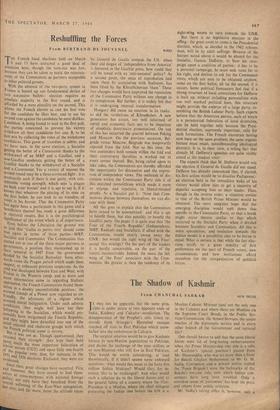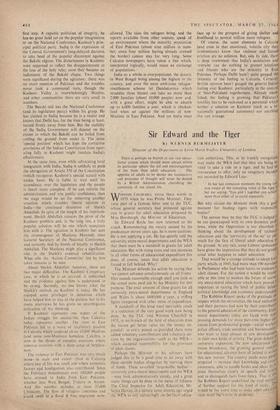The Shadow of Kashmir
From CDANCHAL SARKAR
NEW DELIII T may not be apparent, but the same prin- I ciple is under strain at two opposite ends of India,, Kashmir and Calcutta—secularism. The disappearance of the Prophet's relic (since re- stored) from Srinagar's Hazratbal mosque touched off riots in East Pakistan which snow- balled into the turbulences in Calcutta.
The surgical solution would be to give Kashmir (minus its non-Muslim population) to Pakistan, and decree the exchange of the nine million or so non-Muslims who still live in East Pakistan. This would be worth considering, at least theoretically, if it didn't spawn some awkward questions: what would this mean to the forty-five million Indian . Muslims? Would they, for in- stance, like to be exchanged? And what would such a solution do to the liberal forces and to the general fabric of a country where the Vice- President is a Muslim, where the chief delegate presenting the Indian case before the UN is a Muslim Cabinet Minister (and not the only one in the Cabinet) and where there are Muslims on the Supreme Court Bench, in the Public Ser- vices Commission, the Armed Services, the senior reaches of the diplomatic service and in every other branch of the Government and national life?
One should hasten to add that the same liberal forces were rid of, long-lasting embarrassment when the Prime Ministership (the title is a relic of Kashmir's 'special position') passed from Mr. Shamsuddin, who was no more than a front for Bakshi Ghulam Mohammed, to Mr. G. M. Sadiq. Corruption and a private militia (called the 'Peace Brigade') were the hallmarks of the Bakshi's ten-year rule, over which Indian con- sciences have long been troubled. Only a mistaken sense of 'patriotism' has kept the press and others from public criticism.
Mr. Sadiq's taking office is, however, only a
first step. A capable politician of integrity, he has no great hold yet on the popular imagination or on the National Conference, Kashmir's prin- cipal political party. Sadiq is the expression of the Central Government's long-delayed decision to take heed of the popular discontent against the Bakshi regime. The -disturbances in Kashmir were supposed to reflect the disappointment at the loss Of the holy relic; soon they became an indictment of the Bakshi clique. Two things were significant during the agitation: there was no overt mention of Pakistan and the troubles never took a communal turn, though the .Kashmir Valley is overwhelmingly Muslim, and other communities there are very small in numbers.
The Bakshi still has the National Conference.. (and its legislature party) within his grasp. He has yielded to Sadiq because he is a realist and knows that Delhi has, for the time being at least, turned firmly away from him. But the stability of the Sadiq Government will. depend on the extent to which the Bakshi can be foiled from cutting the ground from under it. The same 'special position' which has kept the corrective provisions of the Indian Constitution from oper- ating fully, in Kashmir might insulate Sadiq's effectiveness.
At the same time, even while adVocating total integration with India, Sadiq is unlikely to push the abrogation of Article 370 of the Constitution (which recognises Kashmir's special status) with undue haste. He is liable to wait until his ascendancy over the legislature and the people is Much. more complete. If he can reform the administration and win public confidence, then the stage would be set for removing another situation which troubles liberal opinion in india----the continued detention of Sheikh' Abdullah. In spite of the length of his imprison- ment, Sheikh Abdullah remains the pivot of the Kashmir problem and, in the long run, a truly popular solution will be one which associates him with it. The agitation in Kashmir has seen the re-emergence of Maulana Masoodi, once General Secretary of the National Conference, and certainly tied. by bonds of loyalty to Sheikh Abdullah. The Maulana might play a significant role in the Sheikh's eventual rehabilitation. What Nile the 'Action Committee' led by him takes remains to be seen About Sheikh Abdullah. however,, there are two major difficulties. 'frhe Kashmir. Conspiracy case, in which he is alt accused. is unfinished. and the evidence against him is understood to he strong. Secondly, no one knows what the Sheikh's outlook on Kashmir is today. He has enjoyed some privileges in detention which have helped him to stay in, the picture, but in his many interviews he has given no unambiguous indication of his thinking
If Kashmir represents one aspect ot the Indian struggle for secularim, then Calcutta today represents another lite riots in East Pakistan led to a wave of 'retaliatory passion in Calcutta which rendered ab.u.tt 63,000 Muslims (and some non-Muslims) homeless. Calciltta is now in the throes of complex emotions where remorse co-exists with a deep sense of 'helpless- ness.
The violence in Fast Pakistan was very much more--in scale and extent—than in Calcutta where loss of life was small and where economic factors and hooliganism also contributed. Since the Febrilary disturbances over 100,000 people have crossed to India from East Pakistan, whether into West Bengal, Tripura or Assam. And this number includes .at least 35,000 Christians.' The flow of refugees continues and would swell to a Bond if fre,: migration were
allowed. The tales the refugees bring, and the reports available from other sources, speak of an environment where the minority population of East Pakistan (about nine million in num- ber, some four million having already crossed the border) cannot stay for very long. Some Calcutta newspapers have taken a line which, interpreted logically, would mean an exchange of populations.
India as a whole is overpopulated. the density in West Bengal being among the highest in the country, and even the most ambitious refugee- resettlement scheme (at. Dandakarnya which straddles three States) can take no more than 2,000 families (about 10,000 people) now and. with a great effort, might be able to absorb up to 6,000. families a year, which is chicken- feed when set against the millions of non- Muslims in East Pakistan. And yet India must
face up to the prospect of giving shelter and livelihood to several million more refugees.
Of course, the saner elements in Calcutta (and even in that emotional, volatile city they predominate) know that violence and forced eviction are no solution. But, side by side, there is deep resentment that India's secularism and restraint can do nothing to protect relations and friends who are the minority in East Pakistan. Perhaps Delhi hasn't quite gauged the intensity of the feeling in Calcutta. Certainly British opinion hasn't gauged the general Indian feeling over Kashmir. particularly in the contest, of Sino-Pakistani togetherness. Already estab- lished, the feeling is growing that Pakistan's hostility has to be reckoned as a perennial which neither a solution on Kashmir (such as a bi- nationally guaranteed autonomy) nor anything else can assuage.



































 Previous page
Previous page